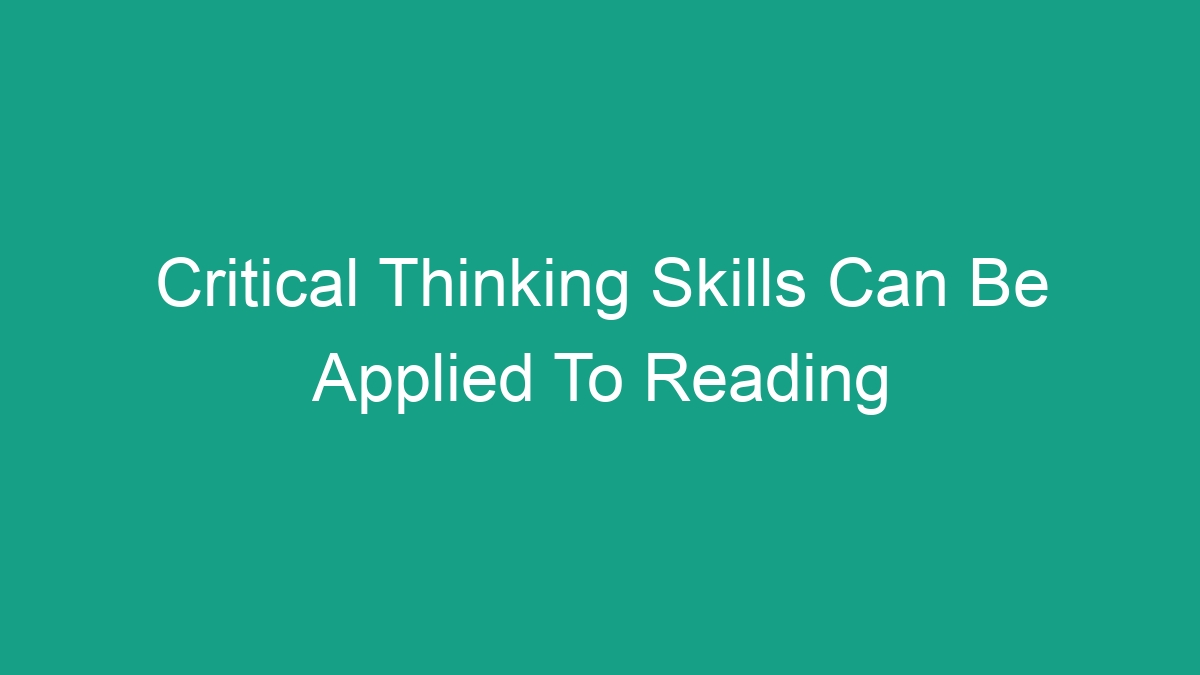
Reading is a fundamental skill that is essential for learning, communication, and overall cognitive development. However, simply reading words on a page or screen is not enough. Critical thinking skills play a crucial role in comprehending, analyzing, and evaluating the information one encounters through reading. By applying critical thinking skills to reading, individuals can gain a deeper understanding of the text, develop their analytical abilities, and make well-informed decisions based on the information they have processed.
Understanding Critical Thinking Skills
Critical thinking is the ability to objectively analyze and evaluate information in order to form a rational judgment or decision. It involves skills such as interpretation, analysis, evaluation, inference, explanation, and self-regulation. When applied to reading, critical thinking enables individuals to go beyond simply absorbing the words on the page and instead engage with the text in a meaningful and analytical way.
How to Apply Critical Thinking Skills to Reading
1. Active Reading: Rather than passively consuming the text, active reading involves being fully engaged with the material. This means asking questions, making connections, and critically evaluating the content as you read. Take notes, highlight key points, and consider how the information relates to your own experiences or knowledge.
2. Questioning: Asking questions is a fundamental aspect of critical thinking. When reading, ask yourself questions about the author’s purpose, the main arguments or ideas, and the evidence provided to support these claims. Questioning the text helps to deepen your understanding and encourages you to think critically about the material.
3. Analyzing Arguments: Many texts contain arguments or persuasive elements. When reading, critically analyze the reasoning behind the author’s arguments. Consider the validity of the evidence provided, the soundness of the logic used, and whether there are any potential biases or fallacies present in the text.
4. Evaluating Sources: In today’s world of information overload, it is crucial to evaluate the credibility and reliability of the sources you are reading. Apply critical thinking skills to assess whether the author is reputable, if the information is supported by evidence, and if there are any potential biases or conflicts of interest at play.
5. Making Inferences: Critical thinking involves making logical inferences based on the information presented. When reading, consider what is implied but not explicitly stated, and use critical thinking to draw reasoned conclusions based on the evidence provided.
6. Synthesizing Information: Synthesis is the ability to combine ideas from different sources to form a cohesive understanding of a topic. Applying critical thinking skills to reading involves synthesizing information from the text and other sources to gain a comprehensive understanding of the subject matter.
The Benefits of Applying Critical Thinking Skills to Reading
By actively engaging with a text and applying critical thinking skills to the reading process, individuals can reap numerous benefits:
– Enhanced Comprehension: Critical thinking allows for deeper comprehension of the material, as individuals are able to analyze and interpret the text in a more profound manner.
– Improved Analytical Skills: Applying critical thinking to reading helps to enhance analytical abilities, which are valuable in a wide range of professional and personal contexts.
– Better Decision-Making: When individuals can critically evaluate the information they encounter through reading, they are better equipped to make informed decisions based on that information.
– Expanded Knowledge: Critical thinking skills enable individuals to engage with complex texts and challenging ideas, leading to a broader and deeper understanding of various subjects.
FAQs
Q: Why are critical thinking skills important in reading?
A: Critical thinking skills are important in reading because they enable individuals to engage with the material in a meaningful and analytical way, leading to deeper comprehension and a more informed understanding of the text.
Q: How can I improve my critical thinking skills when reading?
A: Improving critical thinking skills when reading involves actively engaging with the text, asking questions, analyzing arguments, evaluating sources, making inferences, and synthesizing information from various sources.
Q: Can critical thinking skills be applied to any type of reading material?
A: Yes, critical thinking skills are applicable to a wide range of reading materials, including academic texts, news articles, fiction, non-fiction, and online content. Regardless of the material, critical thinking enhances comprehension and analysis.
Q: Can critical thinking skills be taught and developed?
A: Yes, critical thinking skills can be taught and developed through practice and exposure to a variety of texts. Engaging in discussions, participating in activities that require analysis and evaluation, and seeking out diverse reading materials can all contribute to the development of critical thinking skills.
In conclusion, critical thinking skills are essential for effective reading. By actively engaging with a text, asking questions, analyzing arguments, evaluating sources, making inferences, and synthesizing information, individuals can enhance their comprehension, improve their analytical skills, and make more informed decisions based on the information they encounter through reading. Developing and applying critical thinking skills to reading is a valuable endeavor that can lead to a deeper understanding of the world and the various texts that individuals encounter in their daily lives.



